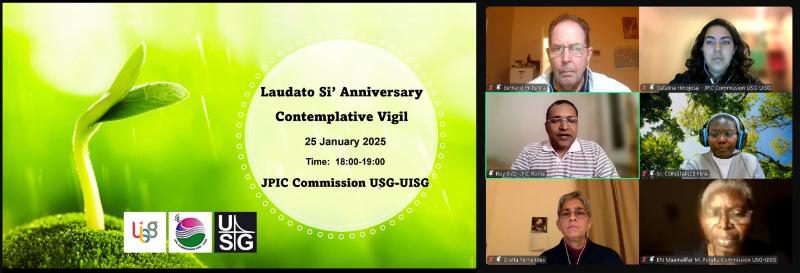Rome (Italy). On 25 January 2025, at the beginning of the year in which we celebrate the 10th anniversary of the Encyclical Laudato Si’ on the Care of our Common Home – signed by Pope Francis on 24 May 2015 – and the 800 years of the Canticle of the Creatures of Saint Francis of Assisi, the Laudato Si’ Movement organized a contemplative online vigil lasting 10 hours, 1 hour to celebrate each year of the Encyclical.
The objectives of the vigil were: to highlight the role of Christian contemplation in addressing the ecological and climate crisis, in light of the 10th anniversary of Laudato Si’; to cultivate a shared space of communion where people from all over the world could gather in contemplation and express their concern for the planet’s development; to strengthen the relationship between networks and communities engaged in caring for creation, for long-term collaboration.
To prepare for this vigil, the facilitators were encouraged to draw on their own tradition, using music, images, guided reflections or simply silence. The intention was to create a space where we can pray with our hearts, in union with all the participants online, who were about 230.
To symbolize the Spirit of Pentecost present at the global gathering, it was chosen not to provide simultaneous translation, leaving the variety of languages and inviting ‘to sit’ in contemplation and unity in moments when different languages were spoken other one’s own.
The Justice, Peace, and Integrity of Creation Commission (GPIC) of the World Unions of Superiors General USG and UISG were asked to lead the vigil from 18:00 to 19:00 (Rome time). The service was carried out by some members of the working group of the Religious Sector for the Laudato Si’ Action Platform, including Sister Chanda Constance Nsofwa, Daughter of Mary Help of Christians, Collaborator of the Youth Ministry Sector and representative of the FMA Institute in this Sector.
The religious led the moment of prayer beginning with a reflection entitled, “The book of creation”, followed by an invitation to pray, contemplate, and act in relation to the challenges of the world. The moment ended with the reading of no. 224 of Laudato Si’: “Once we lose our humility, and become enthralled with the possibility of limitless mastery over everything, we inevitably end up harming society and the environment. It is not easy to promote this kind of healthy humility or happy sobriety when we consider ourselves autonomous, when we exclude God from our lives or replace Him with our own ego, and think that our subjective feelings can define what is right and what is wrong.”
The participants online were involved in the moment of prayer and invited to express themselves in the chat by writing down a word or expression that attracted their attention; to enter into dialogue with God on the words read; to listen and be open to what they could suggest through that passage of LS; to remain silent and let themselves be inhabited by the presence of God at that moment.
With the resolution of Chapter XXIV, the Institute of the Daughters of Mary Help of Christians has decided to involve the whole Institute in a concrete and continuous path of conversion to integral ecology, networking on the seven objectives of Laudato si’, in the spirit of the Preventive System.
For the FMA and the Educating Communities, the experience of the contemplative vigil on Laudato Si’ is part of the concrete commitment to teach the young generations to have a contemplative attitude in order to take care of our Common Home.
Pope Francis in the Catechesis of 16 September 2020, on the theme “Healing the world: Care for the Common Home and contemplative attitude” teaches that “Contemplation, which leads us to an attitude of care, is not a question of looking at nature from the outside, as if we were not immersed in it. But we are inside nature, we are part of nature. Rather, it is done from within, recognizing ourselves as part of creation, making us protagonists and not mere spectators of an amorphous reality that is only to be exploited.
Those who contemplate in this way experience wonder not only at what they see, but also because they feel they are an integral part of this beauty; and they also feel called to guard it and to protect it. And there is one thing we must not forget: those who cannot contemplate nature and creation cannot contemplate people in their true wealth. And those who live to exploit nature end up exploiting people and treating them like slaves. This is a universal law. If you cannot contemplate nature it will be very difficult for you to contemplate people, the beauty of people, your brother, your sister.
In this perspective, contemplation allows us to understand and live more fully our role in creation. It offers a place of prayer to protect our common home. It helps us to meet the present with awareness and love.”
It is an invitation to promote “a new style of formation at all levels, starting from life experience and creating journeys aimed at forming people who are open and flexible, willing to change, capable of generativity and of caring.” (First choice CGXXIV).





















